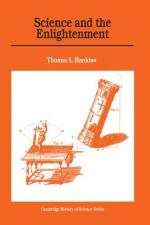|
This section contains 1,167 words (approx. 3 pages at 400 words per page) |

|
Chapter 3, Experimental Physics Summary and Analysis
Since the time of Aristotle, the term "physics" referred to a variety of subject matter, many explicitly philosophical. It wasn't until the Renaissance that experimentation became a common method of investigation, though at the time this type of experimental physics was called "natural magic" and had more in common with Alchemy than with modern physics. Until the 18th century, physics was taught in Latin as a branch of speculative philosophy; whereas, mathematics, useful in the military arts, was taught in the vernacular. This began to change during the enlightenment, however, as it became clear from the work of Newton and others that experimental and quantitative measures needed to be used to help develop and test theories. At the beginning of the enlightenment, experimental physics was the domain of hobbyists and amateurs like Benjamin Franklin. Their success, though...
(read more from the Chapter 3, Experimental Physics Summary)
|
This section contains 1,167 words (approx. 3 pages at 400 words per page) |

|




